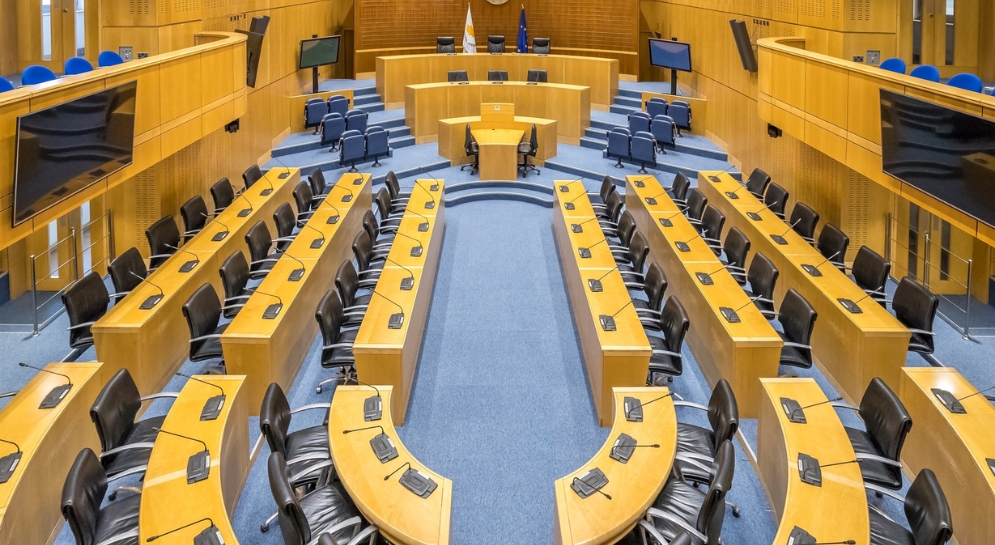
“The climate change does not recognize the dividing line”
Interview with Christina Nicolaou
December 2023, “Voice International”, by Kallis Antounas
Christina Nicolaou, Head of the Energy and Environment Sector of the Central Committee of AKEL, said that on the matter of the decision of the COP28 the essence is for the phasing-out of fossil fuel to be socially just.
She said that the establishment of the Loss and Damage Fund is essential, in a way that it will benefit smaller countries. Nevertheless, there were also positive developments, she noted.
On the matter of Akamas, she underlines the need to stop the road network project and reassess it.
On the subject of common environmental issues, she stated that actions are already being carried out jointly with the Turkish Cypriots, but they must be intensified.
About the COP28, Akamas issue, Bicommunal environmental issues, we discussed with Christina Nicolaou, Head of the Energy and Environment Sector of AKEL, in an interview she gave to “Voice International”.
Question: The 28th United Nations Climate Change Conference (COP28) ended a few days ago. What are the goals for the future of the planet? How do you assess the progress in the goals that have been set for the transition from fossil fuels?
Christina: First of all, let me also thank you for the discussion we are having today. The United Nations Conference ended on Wednesday 12 December. It was scheduled to be completed last Tuesday, but due to the failure to reach an agreement in the talks, it was extended. The Summit began with the key question of whether there will be an abolishment or phase-out of fossil fuels. Unfortunately, they did not agree on one or the other and limited themselves to a statement of the type “transition from fossil fuels”, which in itself does not lead us anywhere because they again leave open the possibility for each state to voluntarily find a way to do this transition from fossil fuels.
So, here where we were expecting the 28th Conference to come out with a much clearer and stronger message that the era of fossil fuels is slowly coming to an end, because scientifically it is what causes the climate crisis and change we see today to a greater extent. Given the situation there and where the Conference took place this year, in Dubai, a purely oil and gas producing country, we understand beforehand that it would be difficult for the participating countries to agree on this path.
Of course, there were some positives. They agreed to triple the production of renewable energy from all countries and to double energy efficiency. There were some positives, we won’t completely level it that it was like it didn’t happen at all.
But the most basic problem which is the abolition or phasing out of fossil fuels and the Loss and Damage Fund, which is aimed at the countries most affected by climate change and these are the island states or the small ones, for the most part, which have huge impacts from the climate crisis. The Fund was established, but not to the extent that we expected, that is, that all countries, which are major polluters, would contribute, so that the developing countries would really be able to cope with these changes.
Question: A question arises here. Since the issue comes down to the international level, to what extent can all countries respond to the same degree at least in the transition, based on their infrastructures, etc.?
Christina: Very apt question! It is one of the issues arising from the UN Climate Change Conferences. This transition must be socially just. Too many countries don’t have the technology, they don’t have the financial means to make the transition. So, it is very important how this transition will be financed, so that all countries are at the same point of the road and not some are further ahead and others further behind. For it to be a fair green transition, as they want to call it, which unfortunately is not what we have in front of us.
Question: Regarding the road improvement projects within the Akama National Forest Park, recently in your written statement you reached some conclusions about the violation of the binding conditions of the project. What is AKEL’s position on the continuation of the project?
Christina: The issue of Akamas, unfortunately, is one of the longest debated issues in our country. Because private interests, private tracts of land, state forests, private and public authorities are also involved. So, it’s a huge issue, how it’s going to be resolved. It was seen in practice that the way decided by the previous administration, of Anastasiades and the previous Minister Mr. Kadis, to solve the issue by fragmenting the area into three pieces instead of an integrated plan of the Akamas area, showed that it cannot be completed in the right way.
Akamas was divided into three areas, the area of Pegeia for which there is still no local plan of how the area will be developed, the area of the National Forest Park, we are only talking about the state-owned peat land, in the area where the illegalities are now taking place and the area of the communities of Akamas, whose local plan was approved last March.
Regarding the latter, we must say that after many efforts by AKEL and the environmental organizations, inside and outside the Parliament, we managed to have the local plan that was approved within a very good framework and gives some guidelines that will help the communities themselves but also to protect the area of Akamas.
Now, in the National Forest Park of Akamas it has been decided that some changes will be made to the road network and the construction of some visitor nodes, so that in this way, as it was presented then, it will be protected, the entrance will be controlled, we will be able to better control who enters and exits, that there are no illegal properties, etc.
During these discussions, AKEL many times said that it is not a sustainable way to protect a national forest park, when we are talking about a road network and 14 visiting nodes and you enter this discussion process, there is a risk of getting out of hand.
We had several discussions, the ad hoc committee of the Special Ecological Assessment, put several clauses down which were approved by the relevant department and quite strict conditions were given as to how this regeneration would be carried out within the National Forest Park. We said okay, pretty strict conditions were put in, even though we disagree with the whole rationale of this kind of development of the National Forest Park. Since there are safety clauses, we proceed and we will see.
Now in the First Phase, where we are now and to understand what is happening, we are still in the First Phase and there are already irregularities and illegalities, during the construction of the road network, there were changes from the binding conditions issued by the competent departments themselves. And this is reality. The Minister himself admitted it, the President of the Republic himself asked to stop the works and it is certainly not because the environmental organizations and AKEL shouted, but because there is indeed an issue of irregularity and illegality in the construction projects.
An administrative investigation was requested by the Minister himself. It was clear from the administrative investigation itself that the conditions for the construction plans were not followed as they should have been. There is road widening where it shouldn’t be, a lot of flora was destroyed, because more trees were uprooted that are difficult to restore, so they froze the projects and we are waiting to see how the government and the Minister will respond. Unfortunately, there should have been a disciplinary investigation to show who is responsible for what happened, it was not done.
We asked the Minister to clarify who is responsible for the disaster that happened but it turned into a blame game, one says the manufacturer is to blame, the other the Forestry Department, the Environment Department, in short everyone is to blame but no one is to blame.
We ask that the works be stopped but closed, because leaving the road works open there in the middle of Akamas will cause much more environmental damage than closing the part that has been opened, completing and restoring the environmental damage at the site which was done, as much as possible and a re-evaluation, where necessary, of the road network. Because we also don’t want to go to the other extreme of shutting down the plan and starting all over again, unless it’s on a completely different basis. To re-evaluate the roads that we and the environmental organizations were ultimately right that (the projects) are in very sensitive areas of Akamas. That is, near the gorge of Avaka, near Lara.
There are many sensitive areas, so they need to be re-evaluated with other criteria. We have no confidence that they will proceed as agreed and on strict terms.
Such an important project has started in one of the most important areas of the whole of Cyprus without having an inspector there every day from the relevant Departments. This in itself shows the importance and concern that the Ministry and the government have to protect Akamas. They could have an inspector there every day and in case the contractor made mistakes he would be stopped or reported etc. There had to be a daily check. It is no excuse that there was no inspector on site.
Quite the opposite, it is a question of the government because there was no one competent to monitor one of the most important projects in our country.
Question: It is often heard that “the environment/nature knows no borders”. In the case of geographically divided Cyprus, does this saying apply? What are the common environmental issues, if there are any?
Christina: First of all, let’s say that this is not just an expression but a reality for Cyprus. Cyprus is an island where climate change and climate crisis do not recognize the dividing line. Our compatriots have the same problems that we have. To a large extent, those in the occupied territories face similar types of problems with uncontrolled development. Corresponding problems the area of Karpasia as the area of Akamas. Where the area of Karpasia is also one of the unique habitats of Cyprus. It is of equivalent value to Akamas.
We must say that AKEL has long-standing relationships and we find ways to cooperate on various issues with our Turkish Cypriot compatriots and with environmental organizations as well as fraternal parties.
One of the biggest projects we organize together is our action with the Anti-Nuclear Platform. We have several contacts and actions against the construction of the nuclear power plant in Akkuyu, which is a long-term effort of more than 10 years of discussions, meetings and informing the world about what is happening now in Turkey with the attempt to build 4 nuclear power plants in our neighbourhood, in a wider field.
But we also make frequent visits to the mines in Lefka, where we have issues, we have issues with the towers and the development authority in Trikomo. We have similar problems in the free areas. We try to find ways to exchange experiences but also to do joint actions to inform each other and act on some things together, because indeed the environment does not recognize the dividing line and what is done on one side will affect the other. These actions must be intensified, but also at every level together with our compatriots T/C.




